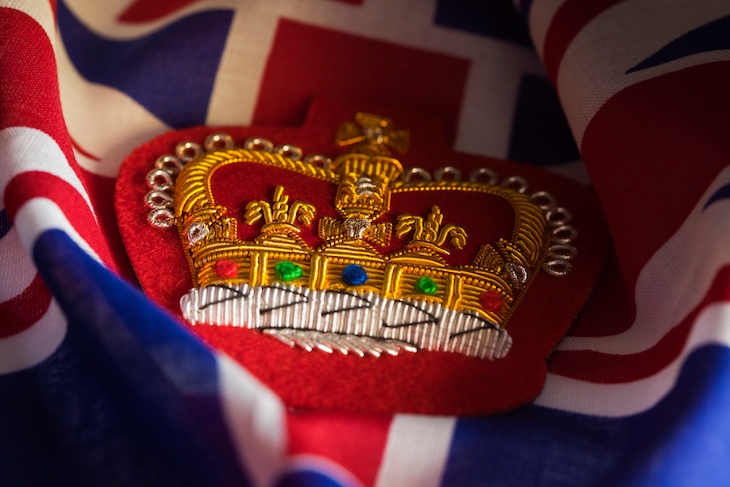Prince Harry does not exist and soon Meghan Markle will cease to exist too. None of the royal family exist. This truth, which has come to me rather late in life, has taught me how to stop worrying and love the monarchy.
Despite my boyhood admiration for King Sobhuza II of Swaziland, I was always a bit of a republican. Not a tumbrils and guillotine kind, nor even, really, a campaigner for abolition, because as the decades have rolled it has become impossible not to feel respect for the Queen’s hard work; and besides, as the Australians have learned, there’s not a lot of point in removing the monarchy unless you can agree on the alternative.
What alternatives suggest themselves? Tame presidencies in Germany and Italy have never seemed to gel as focuses for national identity; while the awkward amalgam of national symbol with political leader that France, the United States or South Africa attempt has always seemed a difficult mental feat. I’ve smiled to watch Americans at dinner attacking their president bitterly — until foreigners join in, whereupon the Americans become tense.
So for many years my proposition has been that if we British ever do away with kings and queens, we must not replace them with papier-mâché presidencies — I don’t know… Betty Boothroyd, Alan Johnson, David Attenborough or Michael Palin, cuddly people — but instead make the full leap from the personification to the abstraction of nationhood. Britain, I’ve argued (probably here) can be — indeed is — an idea. We can love and respect that idea. We don’t need a person in whom to invest our patriotism. It’s juvenile to crave icons and figureheads.
I still think this, but have concluded that abstracted patriotism isn’t going to happen. In us humans the caveman lurks not far beneath the sophisticate, and tribes need chiefs. Strip them of their feathered head-dresses and call them administrators, and popular hunger will grow for something more magical to dance around, whooping.
For some, of course it’s a divinity, which may or may not be linked to a kingdom or caliphate; and a range of models is available: from the Virgin Mary and the Prophet Mohammed at the human end, to Jesus Christ (hybrid), to God, the Holy Ghost, Allah, Jehovah, Gaia, and a great miscellany of spirits or ancestors in the sky, Valhalla, or the African trees. These can be run in tandem with earthly princes whom, if we so choose, the gods may be said to anoint. But all share this essential characteristic: they embody for us ordinary humans something of the mysterious and something of the divine. They offer us magic.
The cult of celebrity is an extension of this deep hunger among mankind for someone to exalt. In our secular age, women with enormous bottoms like the Kardashians, men with enduring sex appeal like George Clooney, or transient celebrities from the world of music or sport — Justin Bieber, David Beckham — enjoy a prince-like status for a few months or years. Read the celebrity pages on Mail Online and you may find yourself caught up in a virtual kingdom with virtual ogres, princesses, princes and frogs.
These worlds, worlds of royalty, celebrity, divinity or presidency, are designed not only to offer us figures to look up to, but figures to fear, pity or despise, too. King John was not a good man. Lucifer fell. Wayne Rooney has been a very naughty boy. Princess Diana was a victim and Eva Peron a saint. And we all have our views on Mary Queen of Scots.
You can see where these reflections lead. With royalty and celebrity, reality lurches into fiction. There is of course a young man with red hair called Harry with a father called Charles, a grandma called Elizabeth, a sweet old great-grandmother called (when alive) the Queen Mother, and an actual mother who was called Diana. All living, breathing people. But we don’t know them. They stand before us with their finery bathed in light but their faces in shadow. Each trails a supposed persona and a cartload of hopes and ideas we’ve constructed around them. They are all in a kind of play, called the Royal Story, with plots and subplots, joys and sorrows; but the narrative is only very loosely related to the real story, to which only they and their intimates are privy. They are walking whiteboards on to which the nation may scrawl its fairytales.
‘Absurd,’ you say. ‘We wouldn’t follow their lives and believe in them if they were only our inventions.’ Wouldn’t we? What then are we doing with The Archers or Coronation Street, in which millions of us take a daily interest, breathless to know what these people (who do not exist) are going to do next? Theatre, soap opera or indeed the English novel only take to its logical conclusion the thinking and feeling which, preferring the drama to be loosely tied to someone you could touch, creates a constitutional (i.e. powerless) monarchy.
Years ago at the Hay Festival in a marquee in a waterlogged field, I debated monarchy alongside the late Elizabeth (Countess) Longford (pro) and Roy (now Lord) Hattersley (anti). On the republican side I seconded Roy, who spoke magnificently. The chairman, William Rees-Mogg, asked for a show of hands to decide the result. The republicans were indisputably the victors. Lord Rees-Mogg declared the result a draw. And we all trooped out into the rain, where a Rolls-Royce waited to carry Roy Hattersley away, to cheers from supporters. The Rolls got stuck in the mud; we supporters put shoulders behind it; and off it slithered with the great republican inside, showering us with mud.
I adore Roy, but on the throne I’d prefer the Queen. And I can thrill with the best of them to Harry and Meghan’s news because they don’t exist. And I wouldn’t have it any other way.







Comments